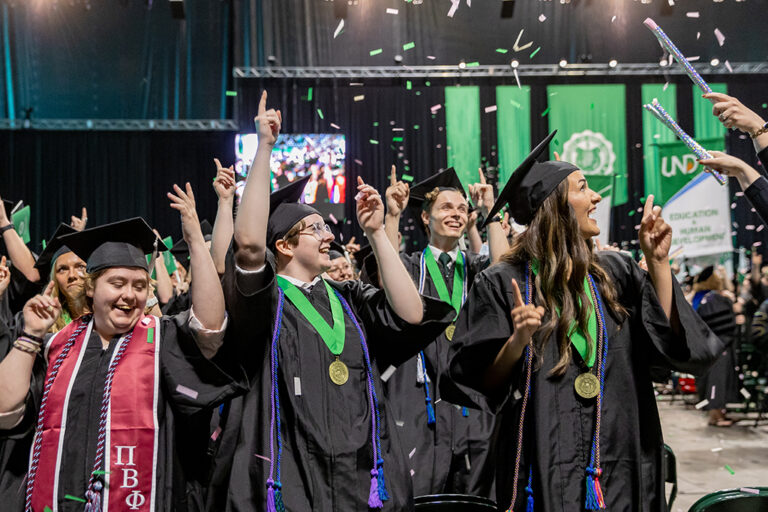UND’s provost draws leadership principles from literature
Provost Eric Link is the latest speaker in the ongoing 18:83 Speaker Series

By Joe Banish
Not many higher education administrators would unapologetically spoil the plot of two classic works of literature for those unfamiliar with them.
But Provost Eric Link did so with the spirit of instilling the traits of effective leadership in attendees during his speech, the latest installment of the 18:83 Speaker Series.
A professor and scholar of American Literature, Link cited the plot of Herman Melville’s novel “Moby-Dick” as a cautionary tale of the danger of hubris, after jokingly telling audience members who hadn’t read the book, “you weren’t about to read it. You didn’t read it in high school, you skipped it in college and read the Wikipedia summary.”
“The problem in Moby-Dick, is that Captain Ahab was so filled with ego, that he forced his ego and will on this group of sailors and sent them on a fool’s errand,” Link continued. “What wound up happening is that everyone ended up dying except for Ishmael.”
Although Link conceded that for most leaders, their work is not a life-or-death endeavor, his takeaway from the novel is “to not be so ego driven that everything you’re trying to accomplish as a team is about you.”
Alluding to authors including Jack London, science fiction writer Philip K. Dick, and William Shakespeare, Link wove his way through the tenets he considers essential to leadership.
Central to these tenets is that character traits rather than formal titles shape leadership ability.
“Being bossy is not leading,” Link said. “Leadership is a privilege, a quality of character, and an approach.”
Link also referenced former President and General of the Army Dwight D. Eisenhower’s leadership philosophy – the importance of lifting your team members up and taking responsibility for the decisions of the team at large.
“Good leaders take responsibility, take blame, and give credit,” he said. “When you do good work, it will get recognized. Maybe not by everyone, maybe not all at once, but you will sleep well at night knowing that you did right by the people whom you are tasked with leading. If you’re just pointing fingers, your respect as a leader will plummet precipitously.”
Link said learning to manage scarce time and resources are inherent challenges leaders must embrace.
“A friend of mine and I were talking once about leadership, and he said, ‘The trouble with leadership is not that you have too much work to do,’” Link said. “‘It is how you put your time into the right work, and make sure you’re doing the right things.’”
Link also emphasized that leadership is not a monolithic endeavor, likening it to a team sport where each member brings a unique and valuable skillset to the table. He said pursuing this approach also builds trust between a leader and their team.
“Get to know them, know their strengths, play to their strengths,” he said. “One of the things I learned early in my career — and I’ve tried to deploy this ever since – is don’t ask your team to follow you as a leader anywhere where you can’t explain why you are doing it.”
Link also cautioned against micromanaging as a leader, arguing that the practice inhibits creativity and innovation.
“It’s all about hiring people smarter than you, giving them good work, getting out of their way, and trusting them,” he said.
The 18:83 Speaker Series will continue on Wednesday, Oct. 4, with Coiya Tompkins, president and CEO of the Community Violence Intervention Center (CVIC). The speech will take place at 2:30 p.m. on the Social Stairs of the Memorial Union.




